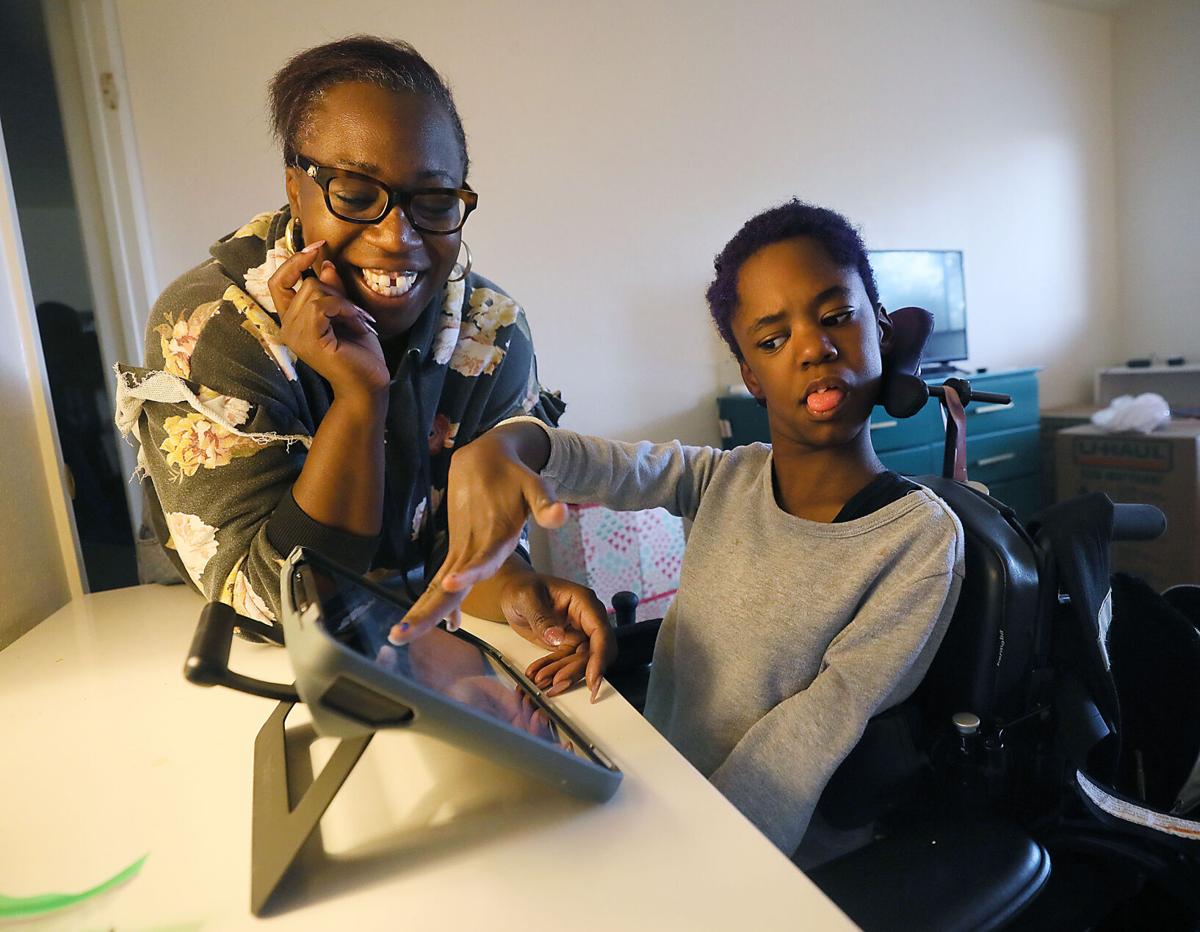Read the original version of this story here.
Emory Webster is 11 years old. She lives in Tucson. She has purple hair and a colorful attitude. She also has cerebral palsy. It is hard for people to understand what she says if they don’t know her well.
Emory uses a communication device. She and her mom call it a “talker.” She selects words and phrases on a screen and the talker speaks them out loud.
Emory had to wait for 1.5 years to get her talker. She got it last November. She cried happy tears. She wants to use her talker with her friends.
That was six months ago. But Emory can’t use her talker yet. She can’t attach it to her wheelchair. It is missing a piece called a “mount.”
Emory’s mom is Adiba Nelson. Adiba is frustrated. She showed us emails and texts from the last few months. She talked to people who work for the state and care providers. They have not gotten Emory’s mount yet.
Talkers are Augmentative and Alternative Communication. You can’t buy them in a store or online. Emory’s talker is made just for her. The Arizona Division of Developmental Disabilities (DDD) is supposed to order the talker and the mount.
Adiba said that DDD thinks Emory's insurance company should pay for the mount. The insurance company says DDD should pay. We learned this from doing interviews and looking at emails Adiba shared with us.
Adiba said “I'm beyond annoyed that they're trying to play chicken with my child...I'm done. I'm done. I'm done.”
Emory’s insurance company is United HealthCare. They did not respond when we asked them about Emory’s mount. DDD would not talk about Emory. They made a general statement.
Emory and Adiba were already frustrated. They spoke to us last summer. They waited for more than a year for the new talker. Emory’s old talker was broken. It sparked and smoked when Adiba turned it on.
We wrote a story about Emory last November. It was by the Arizona Daily Star and the ProPublica Local Reporting Network.
DDD called Adiba and Emory the day after we published our story. They said Emory’s talker was ready. They got it that week.
Hundreds of other people had to wait to get new devices from DDD. DDD got in trouble last year with the Arizona Health Care Cost Containment System. This is Arizona’s Medicaid agency. DDD is not in charge of getting talkers for people who apply after 2020. Now it is up to insurance providers.
Advocates say most of the problems are now solved. But there are still some issues.
Anne Ronan is a lawyer. She works for the Arizona Center for Law in the Public Interest. She thinks thousands of people had problems getting talkers. Some had to wait like Emory. Some could not get training to use them. Some were told they couldn’t have them at all.
Anne said, “The backlog and all of the folks that were in the middle of this mess, those seem to have been resolved best we can tell. There are still families with these complicated issues struggling with getting the right equipment.”
Brett Bezios works for DDD. He wrote a statement about getting people talkers. He said DDD is still in charge of getting talkers for people who applied before 2021.
He wrote, “Upon delivery of the device the member’s support coordinator, together with the member/member representative, reviews the accuracy of the equipment received.”
This means DDD works with people to make sure they have all the pieces they need.
He also wrote, “if an item is missing from the shipment, a notification is sent to the AAC device system manufacturer/supplier to fulfill any missing equipment.”
This means if something is missing, they order it.
Anthon McLaws is an occupational therapist. He owns a company called Therapy One. He is trying to help Emory get a new mount.
He said, “I put all of the blame on this on DDD. With necessary medical equipment, you don’t wait 18 months.”
Anthon said DDD didn’t order Emory’s new mount. DDD paid for an old mount for Emory. It fit an old wheelchair. Emory doesn’t have that wheelchair anymore. The old mount probably wouldn’t fit her new wheelchair.
Getting a new talker is not simple – even when there are no problems. Emory’s talker was programmed by a speech therapist. They also trained her and Adiba. Now it needs to be fitted to her wheelchair. An occupational therapist like Anthon needs to do it. Emory needs to be able to reach the talker. But it can’t block her from doing other things.
Anthon said some workers at DDD don’t think people need talkers. He said one support coordinator told him, “You and I both know most of these kids just use their devices to play games and watch YouTube.”
Emory shared how she uses her talker at a virtual event last year. The event was co-sponsored by the Arizona Daily Star and ProPublica. You can see her use it in this video.
We talked to Emory and Adiba recently. Emory was eating fast food. Adiba said it was a “chicken nuggets, ketchup, fries, juice kinda day.” Everyone was tired and Emory didn’t want to chat.
Adiba said Emory uses the talker “when she’s mad at me..” She said that is “fair enough.” In so many ways, Emory is a typical tween.
Adiba says she’s a typical parent. She wants Emory to be able to learn, thrive, and chat with her friends.
She said, "You as a parent would never not let your child have access to communication for two years."
Anthon emailed Adiba on April 23. He said DDD agreed to pay for Emory’s mount. He was ordering it for her.
Adiba said it will be a while until the mount is ready. Emory probably won’t be able to use it this school year.





